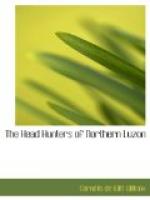The great performance of the morning, however, was a head-hunter dance, arranged by Barton; that is, he had gone out a day or two before and told a neighboring rancheria, that they must furnish a show of the sort for the apos whose visit was imminent. But, according to the old women of the village, he had made a great mistake in that he said it was not necessary to hold a canao in advance. A canao (buni in Ifugao), as already explained, is a ceremonious occasion, celebrated by dancing, much drinking of bubud, the killing of a pig, speeches. Whenever an affair of moment is in hand, such as a funeral or a head-hunting expedition, a canao is held. Our entire stay at Kiangan might be called a canao, or, rather, it was made up of canaos. Now when Barton, two or three days before, refused to canao, the old women shook their heads, declaring that something would happen, and the killings of the morning were at once summoned as proof that they were right and he was wrong. However this may be, not long after the Princesa’s dance we heard below us a cadenced sound and saw a long column in file slowly approaching. Its head was formed of warriors armed with spears and shields stained black with white zig-zags across; the leading warrior walked backward, continually making thrusts at the next man with his spear. A pig had immediately preceded, trussed by his feet to a bamboo, and interfering mightily with the music that followed. This was percussive in character, and was produced by twenty-five or thirty men beating curved instruments, made of very hard, resonant wood, with sticks. These musicians marched along almost doubled over, and would lean in unison first to the right and then to the left, striking first one end, then the other of their instruments,




